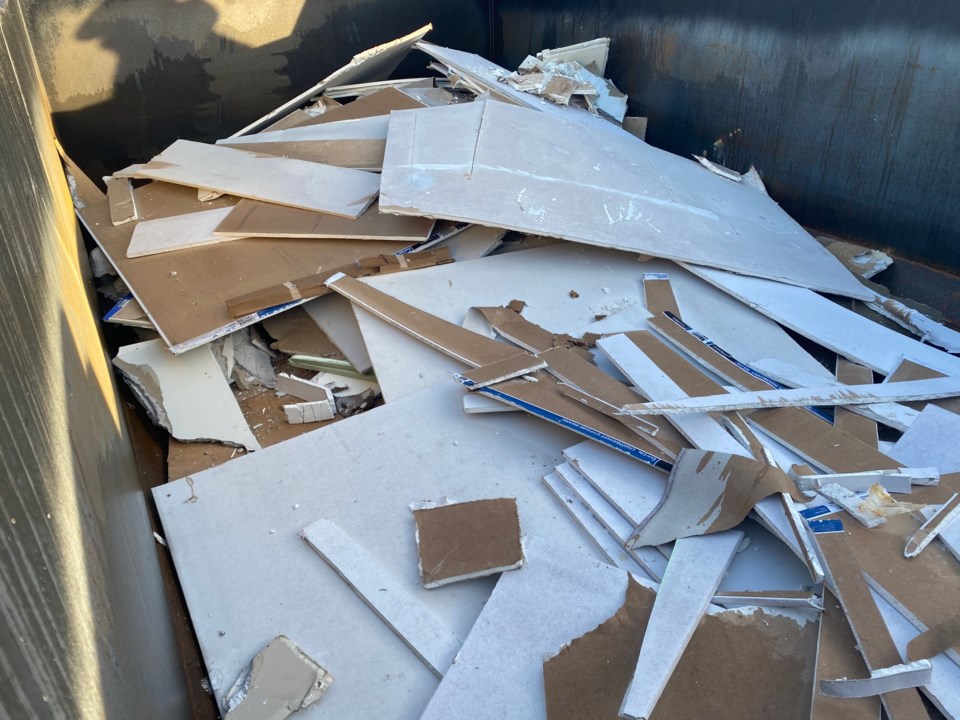The cost to recycle drywall in the Sunshine Coast Regional District (SCRD) is likely to increase by more than 240 per cent, in part because the SCRD has had to spend around $126,000 so far in 2021 to safely take care of asbestos-contaminated material.
On May 13, SCRD directors at the infrastructure services committee meeting voted to increase the cost of recycling drywall from $290 to $1,000 per tonne, and to include the tipping fee increase in a future amendment of the bylaw anticipated at the June 10 board meeting.
Remko Rosenboom, the general manager of infrastructure services, said asbestos-contaminated drywall is an increasing concern from a safety and financial perspective. In 2021 alone, six bins of drywall brought to SCRD facilities tested positive for asbestos, requiring a costly abatement process. Asbestos poses a health risk to those who come into contact with it.
“Currently staff [are] sending away at least one customer a day because the paperwork associated with the drywall is inadequate or is completely missing. Unfortunately, customers are applying dishonest ways to dispose of their potentially asbestos-containing drywall, including providing fraudulent paperwork or mixing drywall into household garbage,” Rosenboom said.
Once the bins at the Sechelt Landfill and Pender Harbour Transfer Station are full, the contents are hauled to New West Gypsum for recycling, the only facility that offers this service in B.C. The SCRD stopped burying drywall in the 1990s and cannot export it to be buried elsewhere.
The new price will include testing each bin of drywall before it leaves the site, and may fund abatement if necessary. Residents dropping off drywall will still need to submit a lab analysis and declaration form. Rosenboom noted that this will not eliminate the risk of asbestos-contaminated drywall being dropped off, but will reduce the likelihood of it happening.
The report to the board said “continuing at status quo is not an option as it would result in further increased cost and would likely result in the SCRD to have to discontinue accepting drywall for recycling.” The board also had the option of only accepting unhung, unused drywall for recycling. Staff did not suggest a preferred recommendation, calling it a “challenging decision” with the risk of exposure and the risk of illegal dumping if product is not accepted.
Directors weighed the options, and all were in favour of the increase except for Area A director Leonard Lee, who voted against the motion.
“As soon as we nail this at $1,000, all of the rural areas that have backroads better get ready, because that’s where she’s heading,” Lee said of contaminated drywall. “This is an unappetizing solution, but I don’t know of any other… We have a bad enough problem” at the current cost.
Area D director Andreas Tize said he didn’t think recycling drywall should be banned outright.
“I’m somewhat dismayed that people are choosing to selfishly ignore regulations, and are therefore costing the community a fortune in order to ... figure out different solutions,” Tize said, adding that he hoped a private contractor would step up to offer the service.
He said he anticipated the cost leading to drywall being dumped in the forest. Sechelt director Alton Toth agreed that increasing the cost was favourable to abandoning the recycling option completely.
Staff will monitor the expenditures and revenues of the cost of testing and abatement, and will provide a future report. Directors also decided to write to the Ministry of Environment and Climate Change Strategy to advocate for a conversation about asbestos disposal and recycling options for residents in the province, and to invite New West Gypsum as a delegation to inform the board about the situation.



